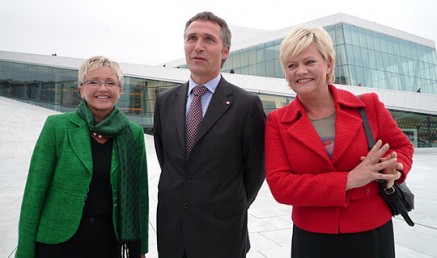Prime Minister Jens Stoltenberg is facing another thorny issue that’s dividing the three-party coalition government he leads. His two government partners won’t back the latest EU directive on rules for temporary workers, while he supports it and thus may need to turn to opposition parties in Parliament that support it as well.

Stoltenberg leads Norway’s Labour Party and normally has the support of the country’s major trade union leaders. In this case, though, labour federation LO also refuses to support rules governing employment of temporary workers that were approved by the European Union (EU) in 2008. As part of its trade cooperation with the EU, Norway is expected to generally go along with most EU directives, although it reserves a right to veto. Stoltenberg wants to avoid using it.
He doesn’t worry that the new EU rules will undermine strict Norwegian regulations governing the use of temporary workers. Both of his government partners, the Center Party and the Socialist Left, do worry, though, that the EU directive collides with Norwegian law that limits use of temporary workers on short-term contracts.
They’re joined by a long list of labour union leaders, the Labour Party’s own youth organization AUF and growing numbers of Labour Party members at the grass roots level. Critics of the EU directive believe it will lead to more use of temporary workers, and weaken workers’ rights to permanent jobs. They want a guarantee that Norwegian workers’ rights will be protected, if they’re to go along with EU directive.

Top Labour Party officials like Stoltenberg, Foreign Minister Jonas Gahr Støre and Labour Minister Hanne Bjurstrøm disagree and don’t think a guarantee is possible to obtain, or necessary. Støre claims that legal experts within the justice, labour and foreign ministries and even LO itself have concluded that Norwegian regulations will be defended if the EU directive is approved. He also points out that labour unions in Europe promoted the EU directive.
It demands, for example, that temporary workers hired in from employment agencies must have at least the same pay and working conditions as those who are permanently employed in the company where they’ll be working. The directive also recognizes the employment agency as the temporary workers’ employer.
Critics, though, worry it will lead to increased use of temporary workers, at the expense of more secure, permanent jobs (called faste stillinger in Norway). That’s among the reasons why the Center Party decided against supporting the EU directive on Monday, claiming Labour can’t guarantee that Norway’s current law will survive if the directive is accepted. The third government coalition party, the Socialist Left, already has opposed the directive.
Center Party leader Liv Signe Navarsete, however, isn’t threatening with what’s called dissens (dissent), which could bring down the government. Instead, she and the Socialist Left will try to get Stoltenberg and his fellow Labour leaders to change their minds on the issue over the next few weeks.
“Warning of dissens is like warning about the collapse of the government,” Navarsete told newspaper Dagsavisen on Tuesday. “There’s no reason to push Labour into the arms of the Conservatives (among opposition parties supporting the EU directive).” That would also leave Stoltenberg’s Labour party in the peculiar position of siding with Norway’s employers’ organization NHO, which supports the directive and the Conservatives, instead of the trade union confederation LO that traditionally supports Labour, and national elections are coming up next year. The issue has yet to be formally discussed at the coalition level called regjeringens underutvalg.
Views and News from Norway/Nina Berglund
Please support our stories by clicking on the “Donate” button now:

